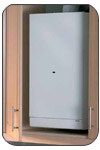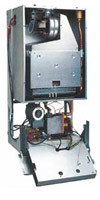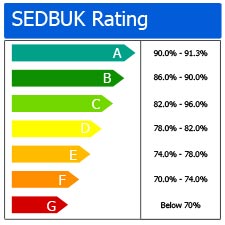Choosing A New Hot Water Boiler
Introduction
As the most important component of a modern central heating system, hot water boilers are by far the simplest and most convenient way to heat water in your home. Improvements in technology over the last few years, along with a requirement to be more energy efficient, mean that modern hot water boilers are smaller and more efficient than ever before.

The two most common forms of fuel for a boiler are gas and oil, with the former being the most convenient as the boiler can be fed directly from the mains gas supply. Wood burning boilers are available, however they require considerably more effort to maintain as the ash created by burning the wood needs to be disposed of regularly - which can be a considerable inconvenience.
The following article will primarily discuss gas fired boilers, however many of these attributes are common to oil fired boilers too.
- All new gas boilers must be installed by a Gas Safe Registered installer, it is against the law for an unqualified individual to install any gas powered device.
- It is very important that gas appliances are installed and regularly checked for safety by a Gas Safe Registered Gas Installer. The Gas Safe Register recommends that you arrange safety checks on an annual basis.
What boiler capacity do I require?
Boilers are avaiable in a multitude of capacity and power outputs, from ones suitable for a small bedsit to those large enough for a mansion property.
Choosing the correct size of boiler is important to ensure that you have enough hot water as and when you need it, also a boiler that cannot meet the requirements of a household will be labouring which means that it's running cost will rise and it's energy efficiency will drop.

Use the following as a guide when considering a new boiler for your home, for an accurate boiler size calculator use the link in the info box at the top of the page:
- Add together the manufacturers recommended heat output for every radiator in your home (figure A).
- To figure A, add 3kW to account for the hot water cylinder (if applicable).
- Add 10% to account for very cold weather in winter.
Condensing boilers
Available as both regular and combination boilers, condensing boilers are more energy efficient than standard boilers as less heat is lost through the flue to the outside. They operate in exactly the same way as a regular boiler, and require the same fixings/equipment/treatment as a regular boiler.
- Current building regulations (Part L) stipulate that all new boilers installed within a property must be an energy saving condensing boiler.
With a regular boiler, the moisture within the exhaust gases passes through the flue as steam and is expelled to the outside. This means a large amount of heat, or energy, is lost.
A condensing boiler contains a heat exchanger which extracts the heat from the exhaust gases, thus condensing any water contained directly within the boiler itself, rather than being expelled via the flue. This heat is used to pre-heat 'cooling' water returning through the system to the boiler. As it takes less energy to heat the pre-heated water, this means a condensing boiler uses less energy during an average heating cycle.
The condensed water is usually drained into the plumbing system of the property. In a highly efficient boiler this is a very small amount of water.
Combination boilers
A combi (combination) boiler provides hot water to a sealed central heating system, as well as instant hot water to taps and showers.

The major difference between a combi and any other type of boiler is that a combi eliminates the need to store hot water within a property, so there is no requirement for a hot water cylinder in the airing cupboard.
Modern combi boilers are both a high-efficiency water heater and a central heating boiler combined within one compact unit. Because you do not need to find space to accommodate a water storage cylinder, cold water storage cistern or other familiar components of a conventional heating system, combi boilers are an excellent solution to your hot water needs if you're considering a loft conversion for example.
Combi boilers also offer a significant saving on hot water costs, as you only heat the water you use, plus they operate at mains water pressure, meaning you can enjoy a powerful shower without the need for a water pump.
On top of all this, combi boilers are often a lot cheaper to install, as they do not require tanks in the roof space, which means less pipe work and a shorter installation time.
If this all sounds too good to be true, it must be noted that they are often not the best solution for a large household. If you have a large property, and require a lot of hot water to be produced at the same time (for instance first thing in the morning as everyone prepares for school and work), a combi might not be the best solution.
SEDBUK energy rating
SEDBUK stands for 'Seasonal Efficiency of a Domestic Boiler in the UK'. The system was developed under the UK Government's energy efficiency best practice programme with the co-operation of boiler manufacturers, and provides a basis for fair comparison of different models of boilers.
The SEDBUK rating is the average annual efficiency achieved in typical domestic situations, making sensible assumptions about climate, control, pattern of usage and other similar factors.

The rating is calculated from laboratory tests together with other important factors such as boiler type, fuel used, ignition type, UK climate, boiler water content and typical domestic usage patterns. For estimating annual fuel running costs SEDBUK is a better guide than laboratory test results alone.
Ventilating a boiler
As all new boilers must be fitted by a Gas Safe Registered installer, the ventillation of a new boiler is not a DIY task. However it must be noted that a flue should be regularly maintained to ensure that airflow is kept to a maximum.
If a gas powered device, including a boiler, becomes starved of oxygen then the product will create highly poisonous carbon monoxide (CO) as a by-product rather than harmless carbon dioxide (CO²). The most common cause of oxygen starvation is a blocked flue.
- Do not fit a mesh, or any sort of vent, to a flue as this can easily become blocked.
- Be careful where you site the flue for your boiler, as on a cold day the small amount of water vapour expelled is quite noticable as a steam cloud. This could be a nuisance for a neighbour if the flue is sited very close to a their window.
Further information and useful links
- Hot water systems
- Hot water supply considerations for showers
- Heating your home using radiators
- Mains water systems
- Full guide to the building regulations
- Choosing a registered heating engineer
- Find a Heating Engineer near you
- Find a Gas Safe Registered Engineer near you
- Find a Plumbing Merchants near you
Site Pages
Featured Articles





